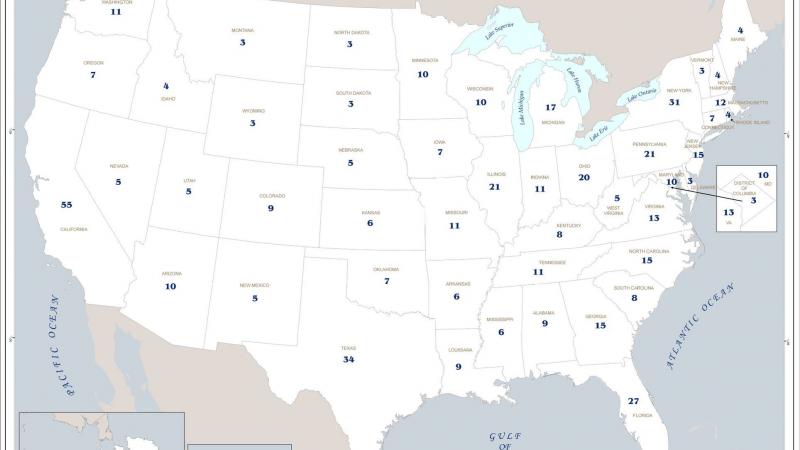Data suggest Florida's record-breaking coronavirus days may have been inflated by as much as 30%
The state appears to be posting backlogged cases as if they occurred on the days in question.
Florida health officials appear to have inflated recent record coronavirus case numbers there by as much as 30%, according to an analysis of data released by the state's Department of Health.
U.S. health officials have been warning for several weeks that COVID-19 case trends in Florida are pointing to a possible looming catastrophe as the state records ever-increasing numbers of the disease. After several months of flat infection rates, positive case results in Florida began rising slowly in mid-June before beginning a steep climb near the end of the month.
Deaths in the state have remained largely flat over that time period, leaving experts struggling to explain why surging case rates have not resulted in an uptick in mortality. One possibility, according to data provided by the state itself, is that the new case numbers regularly posted by Florida health officials have been significantly inflated in recent weeks.
'Chart date' vs 'event date'
At issue is how Florida quantifies its COVID-19 data. The state's dashboard presents new cases in a relatively straightforward manner, presenting a bar chart that displays "new cases of residents by day."
Yet the state's wealth of coronavirus data is significantly more multifaceted than that. An ArcGIS data manager allows users to access detailed, cross-referential data readouts for all of the state's confirmed coronavirus cases, including the sex, age group, region and "origin" of each case, among numerous other metrics.
Two of those data options are "case date" and "event date." The state in a Department of Health document defines the case date as the "date used to create bar chart in the Dashboard," while the "event date" is defined as the "date symptoms started, or if that date is unknown, date lab results were reported to the DOH."
That subtle distinction means that many cases posted to the dashboard may not meaningfully align with the date on which they were posted. Users may thus be misled into believing that case dates on the chart represent timely data, recent cases from which current trends may be reliably derived. However, charted case dates may in fact represent "events" — positive tests or illness-onset dates — that came weeks or even months before.
A charted display of both of those metrics indicates as much. Data show that the state was apparently undercounting thousands of cases between early and mid-June, after which through the end of June and into early July it began posting what were presumably the backlogged cases it had missed in the prior weeks.
File
After June 20, the state had several skyrocketing case days approaching 10,000 "new" cases; the number of event-date cases on those days was lower sometimes by 25%. On the state's highest-charting day so far, July 4, officials posted around 11,400 cases; the "event date" metric indicates a little over 8,000 cases on that day, about 30% less than the figure posted on the dashboard and cited in nationwide media outlets.
State officials give conflicting responses
Though the Department of Health clearly ties "event dates" to the onset of symptoms in many cases, state health department representatives gave a series of conflicting responses when questioned about the matter.
Asked about the difference between chart dates and event dates, a department official said in an email to Just the News: "Event date will be updated as more information is gathered about the case. For instance, we would not know the person’s onset date when we received the lab result."
"The county interviews the individual and determines their onset date," the official added, "so the 'event date' would change."
Further queries seeking clarification on the state's data-gathering practices were eventually met with a reply from Alberto Moscoso, the director of the health department's Office of Communications.
"Epidemiologists collect information that informs the Department of Health of an individual’s symptoms, contacts and location of where they may have acquired COVID-19," he told Just the News.
"The first date of entry in answer to any question, COVID-related or not, is designated the event date," he continued. "The average period of incubation for COVID-19 is about 5 days, with the longest period of incubation being 14 days. It is important to keep this in mind as many event dates are listed months before the onset of the illness."
"Thus, the event date should be viewed as the first date noted as part of an epidemiological investigation, and not be interpreted as the onset date for COVID-19," he added. "In some situations, the event date may represent the onset of COVID-19 symptoms or when the individual tested positive."
Moscoso's claim that the event date should "not be interpreted as the onset date for COVID-19" appears to conflict at least partially with both the state's posted definition of the term as well as the earlier email from the health department suggesting that the onset of illness is tied directly to the "event date."
Just the News requested further clarification on these discrepancies; eventually the health department simply copied and pasted Mosoco's earlier reply and re-sent it.
Determining the onset date of symptoms is critical for public health officials in determining the current course of the pandemic, as unclear or misplaced data can scramble key epidemiological indicators used to determine a disease's path in a given community.
Data problems have cropped up in numerous other localities as well. The Texas health department, for instance, this week revealed that it lacks illness-onset data for nine out of every ten coronavirus infections reported in the state.
Los Angeles County, meanwhile, posted a record number of coronavirus cases on Tuesday of this week, but the state admitted that the huge increase came "in part" as a result of a few thousand backlogged cases.
















